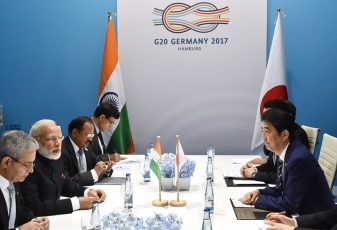Japan-India Relations
Japan-India Summit Meeting
July 7, 2017


1 Mr. Shinzo Abe, Prime Minister of Japan held a meeting with H.E. Mr. Narendra Modi, Prime Minister of India on July 7 from 3:05 p.m. to 3:40 p.m. in Hamburg, Germany, which the leaders were visiting in order to attend the G20 Summit. The bilateral meeting was the ninth meeting between the two leaders.
2 At the beginning of the meeting, Prime Minister Modi stated that he was pleased to be able to meet at each opportunity in international conferences, that the Japan-India partnership has blossomed greatly since 2014, and that he was eagerly anticipating the visit of Prime Minister Abe to India. In response to this, Prime Minister Abe stated that he was pleased to be able to meet again following the summit meeting held last November in Japan, that the Japan-India strategic dialogue is progressing, and that he was looking forward to his visit to India this year.
3 Prime Minister Abe stated that together with Prime Minister Modi he wanted to dramatically enhance the "new era in Japan-India relations" and lead the peace and prosperity of the Indo-Pacific region and the world, and that on the coming visit to India he would materialize the cooperation regarding the "Free and Open India and Pacific Strategy" and "Act East" policy. In response to this, Prime Minister Modi stated that both Japan and India play large roles in building an order of democracy and the rule of law, and that he wanted to further strengthen Japan-India cooperation.
4 After that, the two prime ministers held a candid exchange of views regarding the major issues between Japan and India, including politics and security, high-speed rail, the economy and economic cooperation, etc., and about the regional situation.
(1) Prime Minister Abe stated that the Malabar joint maritime exercise by Japan, India, and the United States next week is a symbol of Japan-India defense cooperation and Japan-India-United States cooperation, and Prime Minister Modi also stated that he wanted to further advance defense cooperation with Japan and specific trilateral cooperation between Japan, India, and the United States.
(2) Prime Minister Abe expressed his expectations for the prompt entry into force of the Japan-India nuclear energy agreement and the implementation of nuclear energy cooperation, and Prime Minister Modi expressed his gratitude for the efforts of Japan.
(3) Regarding the high-speed railway between Mumbai and Ahmedabad, the two prime ministers agreed to make steady progress in order to be able to show specific outcomes promptly.
(4) The two prime ministers agreed that candid discussions between the leaders regarding the various issues in the region are important, and confirmed that they would exchange further information regarding the issues surrounding North Korea, etc. and that they would cooperate closely to make the sanctions by the international community effective.
2 At the beginning of the meeting, Prime Minister Modi stated that he was pleased to be able to meet at each opportunity in international conferences, that the Japan-India partnership has blossomed greatly since 2014, and that he was eagerly anticipating the visit of Prime Minister Abe to India. In response to this, Prime Minister Abe stated that he was pleased to be able to meet again following the summit meeting held last November in Japan, that the Japan-India strategic dialogue is progressing, and that he was looking forward to his visit to India this year.
3 Prime Minister Abe stated that together with Prime Minister Modi he wanted to dramatically enhance the "new era in Japan-India relations" and lead the peace and prosperity of the Indo-Pacific region and the world, and that on the coming visit to India he would materialize the cooperation regarding the "Free and Open India and Pacific Strategy" and "Act East" policy. In response to this, Prime Minister Modi stated that both Japan and India play large roles in building an order of democracy and the rule of law, and that he wanted to further strengthen Japan-India cooperation.
4 After that, the two prime ministers held a candid exchange of views regarding the major issues between Japan and India, including politics and security, high-speed rail, the economy and economic cooperation, etc., and about the regional situation.
(1) Prime Minister Abe stated that the Malabar joint maritime exercise by Japan, India, and the United States next week is a symbol of Japan-India defense cooperation and Japan-India-United States cooperation, and Prime Minister Modi also stated that he wanted to further advance defense cooperation with Japan and specific trilateral cooperation between Japan, India, and the United States.
(2) Prime Minister Abe expressed his expectations for the prompt entry into force of the Japan-India nuclear energy agreement and the implementation of nuclear energy cooperation, and Prime Minister Modi expressed his gratitude for the efforts of Japan.
(3) Regarding the high-speed railway between Mumbai and Ahmedabad, the two prime ministers agreed to make steady progress in order to be able to show specific outcomes promptly.
(4) The two prime ministers agreed that candid discussions between the leaders regarding the various issues in the region are important, and confirmed that they would exchange further information regarding the issues surrounding North Korea, etc. and that they would cooperate closely to make the sanctions by the international community effective.

